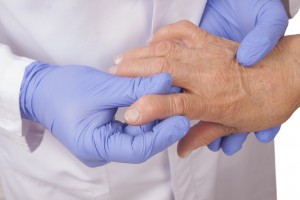-
International Team Creates Heart Disease Risk Tool Tailored to Rheumatoid Arthritis Patients
 Method may shed light on how to better gauge heart health in lupus, other inflammatory diseases
Method may shed light on how to better gauge heart health in lupus, other inflammatory diseases
Rochester, Minn. — Rheumatoid arthritis patients overall are twice as likely as the average person to develop heart problems. Pinpointing which rheumatoid arthritis patients need stepped-up heart disease prevention efforts has been a challenge; research by Mayo Clinic and others has found that standard heart disease risk assessment tools may underrate the danger a particular person faces. To better pinpoint rheumatoid arthritis patients’ heart disease risk, an international team that includes Mayo researchers has created a heart disease risk calculator tailored to rheumatoid arthritis.
Details on the new method, known as the Transatlantic Cardiovascular Risk Calculator for Rheumatoid Arthritis, or ATACC-RA, were presented at the European League Against Rheumatism annual meeting June 11-14 in Paris. The research team includes institutions from around the United States, Canada, Mexico, South Africa and Europe; Mayo is gathering and analyzing the group’s data.
Initial findings show the new calculator is more effective for rheumatoid arthritis patients than standard heart disease risk calculators such as the Framingham and SCORE risk assessment tools. For example, of 314 rheumatoid arthritis patients studied who eventually developed heart problems, Framingham classified 54 percent, or 168 people, as high risk; ATACC-RA identified 201, or 64 percent, as high risk.
“There are completely new factors that are considered,” says co-author Sherine Gabriel, M.D., a rheumatologist and epidemiologist at Mayo in Rochester. “What’s unique about this calculator is that it incorporates rheumatoid arthritis disease characteristics into the assessment of cardiovascular risk.”
Research by Mayo and others shows that major predictors of heart disease in rheumatoid arthritis have to do with the rheumatoid arthritis itself, including the disease, inflammation and perhaps treatments, Dr. Gabriel says. The new risk tool includes such factors; the Framingham and SCORE calculators do not.
The ATACC-RA calculator is designed to accurately predict rheumatoid arthritis patients’ chances of developing heart disease within 10 years. The group plans further work to test and refine the calculator so it can be personalized for patients, says Dr. Gabriel, who is working with Mayo biostatistician Cynthia Crowson on the project.
The risk tool could also benefit people with other inflammatory rheumatic diseases that carry higher heart disease risk, such as lupus and psoriatic arthritis.
The international work to develop a better calculator is just part of the picture when it comes to stopping heart disease in rheumatoid arthritis patients. It is important for patients and physicians to be proactive, Dr. Gabriel says.
“I think it’s important for patients with rheumatoid arthritis to understand that their disease alone carries added risk of heart disease and discuss that with their rheumatologist and perhaps suggest that their rheumatologist work with a cardiologist or a preventive cardiology clinic to come up with a plan to reduce cardiovascular risk,” Dr. Gabriel says.
Mayo Clinic last year established a Cardio-Rheumatology Clinic to prevent heart disease in patients with chronic inflammatory forms of arthritis and to catch it early if it develops.
The study presented at EULAR was funded by the participating institutions. They include Diakonhjemmet Hospital in Oslo, Norway; Umea University in Sweden; Dudley Group NHS Foundation Trust in West Midlands, England; University of Athens in Greece; Radboud University Medical Center in Nijmegen, Netherlands; Harbor UCLA Medical Center RHU, Torrance, Calif.; Hospital Universitario Marques de Valdecilla, IFIMAV, in Santander, Spain; Harvard Medical School Brigham and Women’s Hospital in Boston; University of Witwatersrand in Johannesburg; University of Manitoba in Winnipeg, Manitoba; and Instituto Nacional de Ciencias Medicas y Nutricion Salvador Zubiran in Mexico City.
Researchers hope others, including institutions in Asia, Africa and Australia, will join the project.
###
About Mayo Clinic
Recognizing 150 years of serving humanity in 2014, Mayo Clinic is a nonprofit worldwide leader in medical care, research and education for people from all walks of life. For more information, visit 150years.mayoclinic.org, MayoClinic.org or https://newsnetwork.mayoclinic.org/.
MEDIA CONTACT: Sharon Theimer, Mayo Clinic Public Affairs, 507-284-5005, Email: newsbureau@mayo.edu







